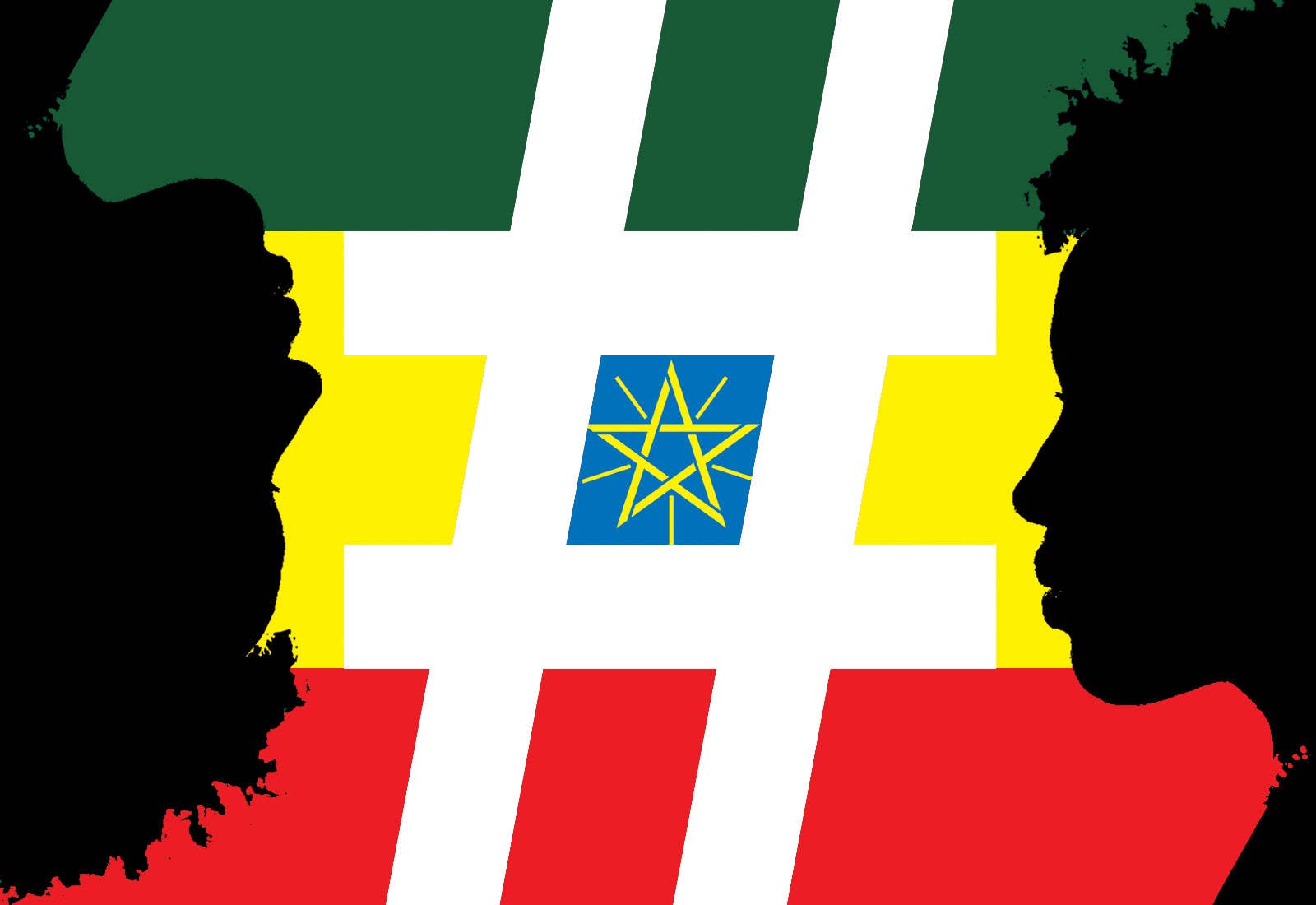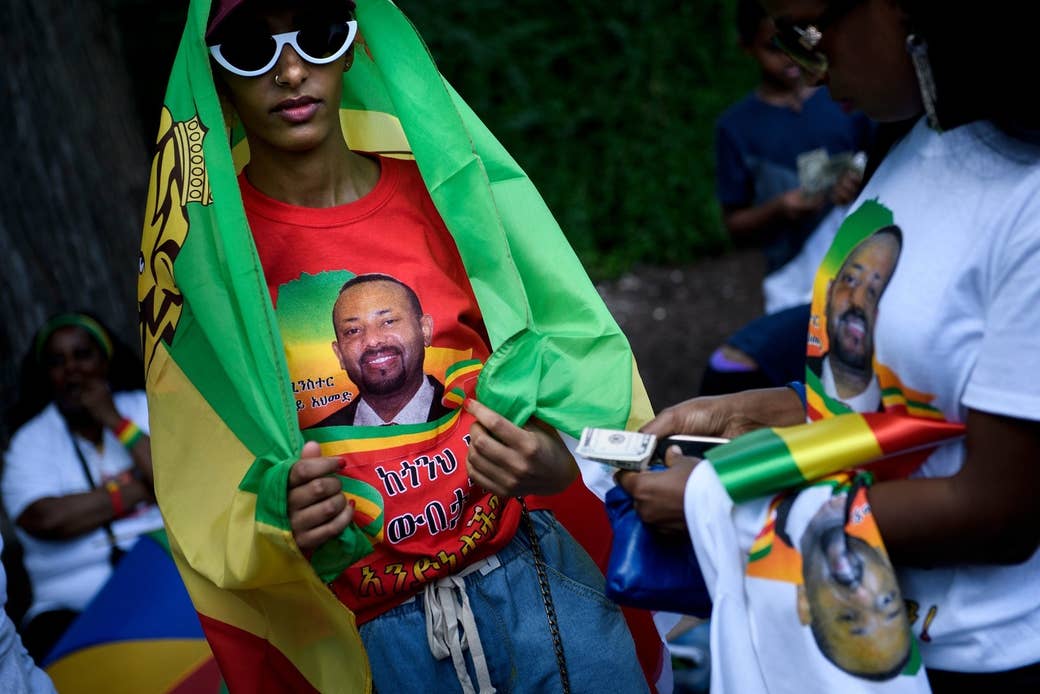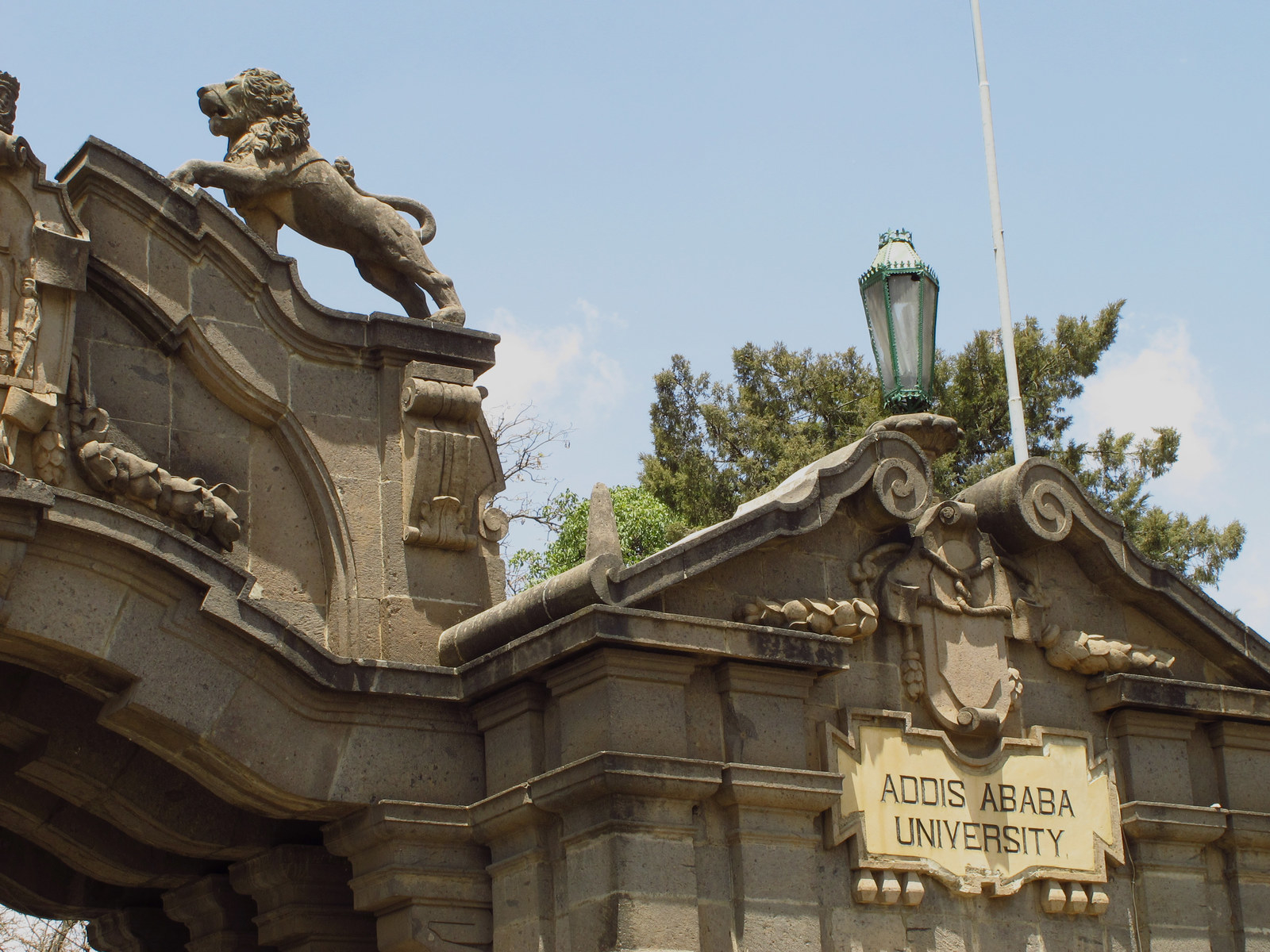
NAIROBI — A popular Instagram account uniting the Ethiopian community over its love for the country's national dish has morphed into a growing #MeToo movement that’s providing a platform for people to anonymously share their stories of sexual violence.
The spread of hashtags and testimonies across social media are forcing Habesha communities in Ethiopia and across the diaspora to confront a topic that has routinely been ignored.
Created by Ethiopian American women in light of an explosive documentary about R. Kelly’s alleged sexual abuse of minors, #MeTooEthiopia has shown hundreds of Ethiopian women and men that they are not the only ones carrying trauma as victims from sexual violence. And unlike the broader #MeToo movement — which was started by black American activist Tarana Burke in 2006 and resurfaced in 2017 when dozens of Hollywood actors came forward with allegations of sexual abuse by former movie producer Harvey Weinstein — #MeTooEthiopia acknowledges the specific cultural barriers women face when it comes to speaking up about sexual violence: the shame surrounding it, and the difficulty of empowering women in a society that denounces feminism as a Western product that has no place in Ethiopian culture.
The movement comes at a pivotal moment in Ethiopia, whose House of Representatives last April elected Abiy Ahmed, 42, as prime minister. Abiy has made headlines by brokering a historic peace deal with neighboring Eritrea, and appointing women politicians to prominent positions in Parliament, as well as the nation’s first woman head of the Supreme Court. Many believe he could be the first modern-day leader to actively champion women’s rights in the country. But movements like #MeTooEthiopia want to send a message loud and clear to Abiy and his cabinet: Gender parity in the government is not enough if women are still getting abused.
And while the #MeTooEthiopia movement is largely supported by feminists within Ethiopia who have been working on different initiatives around gender equality for years, its presence has also unearthed — and forced its founders to reckon with — the complexities of diaspora politics, and the question of who, if anyone, is most entitled to lead the charge toward women’s empowerment in Africa’s second most populous country.

In January, when Lifetime aired Surviving R. Kelly, a six-part documentary about the R&B singer’s numerous sexual assault allegations, M., a small business owner in her thirties — who asked that her full name not be used out of concern for how her work with #MeTooEthiopia could affect her employment — realized it was time to ask: Who are the R. Kellys of the Ethiopian community?
So she posed the question to her nearly 48,000 followers on @ShadesOfInjera, an Instagram account named after a staple Ethiopian food, that fosters discussions on topics considered taboo in the Ethiopian community such as sex, dating outside the community, and religion (especially if it’s not Christianity or Islam).
As an Ethiopian American women who feels slightly less bound by the pressure of cultural norms — and with easier, more affordable access to the internet — M. told BuzzFeed News on the phone from California that she felt obligated to use the @ShadesOfInjera platform, which she created seven years ago, to challenge norms and foster change.
“Just because we don’t talk about sexual violence doesn’t mean it isn’t happening,” she said.
M. said that the responses to her inquiry about sexual abusers in Ethiopia were so overwhelming, both in volume and severity, that she didn’t sleep for two days as she tried to process them all.
One read: “My father been doing this shit to my sister and I for YEARS throughout our childhood, adolescence and adulthood even. And when we finally had the [courage] to confront him about it, he, without a flinch in his eye, calmly, simply and nonchalantly said, ‘...it’s common.’”
“Just because we don’t talk about sexual violence doesn’t mean it isn’t happening.”
Another contributor wrote that a family friend, who was considered an uncle and was 10 years older, assaulted them at a wedding in Ethiopia.
“I eventually called him out about it 12 years after it happened and told my dad,” the person wrote. “My dad said it was part of God’s plan. So obviously we still have a lot of work to do in our community.”
In the caption that went with the post, M. wrote, “It seems like no one reports or talk about the rape, harassment and assault that goes in our community. The monsters live a regular life among us with no consequences and continue to do it to others.”
M. said that many of the hundreds of testimonies she received via direct message that followed her initial post were “extremely raw, and they were desperate for help,” adding that she came across some forms of abuse that she would not have considered assault, things to which she found herself saying, “Me too.”
That was when she realized that what was happening needed its own platform separate from @ShadesOfInjera. She reached out to two of her friends a couple of days after the R. Kelly post, and created a new account called @MeTooEthiopia. Though the page only has about 1,500 followers, it’s already shown the impact that speaking up about sexual violence can have.
One of the people who was empowered to share their story because of #MeTooEthiopia was S., who was 5 years old the first time she was sexually molested by her older cousin. He was 18 or 19 at the time — she can’t quite remember, but knows for sure that he was “almost an adult” — and used to play games with her at their Ethiopian American family’s parties.
“I’d see him at holidays,” S., now 36, told BuzzFeed News on the phone from the DC metro area. She asked that her full name be withheld from the story because she does not want her family to know that she spoke to the media about what had happened to her. “He would take me to my room, and we’d be playing, and then he molested me.”
He never penetrated her, but S. said he kissed her with his tongue and “would do any type of foreplay that a couple does before having sex.” She remembers him warning her not to tell anyone about what he was doing to her, and threatening to hurt her or her parents if she did. He said it was their secret.
“No one had ever mentioned anything like that to me before. I was scared and confused.”
“I knew something wasn’t right, but I didn’t know what it was, because I’d never seen anyone else doing that,” she said. “No one had ever mentioned anything like that to me before. I was scared and confused.”
The abuse, she said, went on for three years.
One evening at another family gathering, S., who was by then 8 years old, was sitting on her cousin’s lap — the one who had repeatedly been molesting her — and realized she couldn’t take it anymore. Having endured his abuse for so long, she thought to herself, “Whatever bad thing that might happen after I tell someone, at least it will stop.” So she pulled her mother aside at the party and told her.
“I barely told her the surface-level details of what he did, only that he had touched me,” S. said. “She was really shocked and called him into the room. I don’t remember what she said to him, but I remember him denying it, shaking his head, and saying, ‘I swear to god, I’ve never touched her.’”
S. doesn’t remember much else that night: not how her mother responded to her cousin’s denial, or the rest of the party, or even going to bed. She thinks she’s blocked out some of the details of that night because of how traumatic it was.
Her mom did not go to the police, and in the days and months that followed the confrontation, she said, “Nothing happened. He never came to our house again, but I would still see him at family events outside of our house.”
S. convinced herself that because she could not wrap her mind around what her cousin had done to her, or why, she must have made the whole thing up.
“I thought, What kinds of things did I put in my head?” she said, holding back tears on the phone. “But then I got older and learned what sex was, and it all came back to my memory, everything that happened to me as a kid.”
S. realized, “Oh my god. I know this. I’ve seen this. I didn’t make it up. I was abused as a child, I just didn’t have a word for it.”
“Sex is so taboo in our community. They basically made like it never happened.”
New emotions crept up inside of S. following her realization: a renewed sense of anger and hatred toward her cousin, loneliness at never having had a chance to process her molestation, and shame.
“No one ever sat me down and talked to me about it, or told me that I hadn’t done anything wrong,” she said. “Sex is so taboo in our community. They basically made like it never happened.”
#MeTooEthiopia organizers have said that the lack of open discussion within the community around sexuality, much less sexual violence, adds another layer of difficulty to speaking up about abuse.
Tiemert Shimelis was one of the people M. asked to help her launch the @MeTooEthiopia Instagram account and website. A longtime @ShadesOfInjera follower, Shimelis, who is in her thirties and lives in DC (home to the largest Ethiopian diaspora community in the US), was one of the hundreds of people who responded to M.’s question with a story of her own experience of being sexually abused. She told BuzzFeed News that the feeling of shame is the “main evil that women fight when it comes to sexual assault stories in Ethiopia.”
Shimelis, who works as an English interpreter for speakers of Amharic (one of Ethiopia’s most popular languages), wrote about her own experiences with sexual assault — once by a relative in Ethiopia when she was younger, and once by an acquaintance in DC when she was older — which has been published on #MeTooEthiopia’s site. She said that other cultural factors, like a deeply ingrained respect for elders, discouraged victims of sexual violence from speaking out.
“Most of the time, it’s older men who do this to you, so you won’t be believed,” she said. “It’s more likely that your parents would move towards shushing the whole thing because they’re going to be outcast from the community if they dare question the integrity or morals of a certain elder.”
Shimelis added that economics also plays a role in preventing people from coming forward. If a woman is financially dependent on her abuser — which could easily be the case in a country where women are unemployed at twice the rate of men — accusing him of being sexually violent could affect their livelihood.
There’s another major obstacle that activists in Ethiopia and the diaspora face: Ethiopian culture regularly dismisses anything considered a product of the West, like feminism.
The denigration stems largely from the fact that Ethiopia is one of the few countries in the world, and the only country in Africa, that was never colonized, though it was invaded and occupied by Italy from 1935 to 1936. It serves as a huge point of pride for Ethiopians, and for many Pan-Africanists, but also fuels the critique that any attempt to address issues within the community, like sexual violence against women, simply comes from a desire to emulate the West, and to drag down Ethiopian culture.
It’s a characterization that Hilina Berhanu, cofounder of Ethiopia’s first official feminist organization, the Yellow Movement, thinks about constantly. Berhanu, 27, earned her master’s degrees in Europe, and helped establish the Yellow Movement on the campus of Addis Ababa University in 2011.

“We work in a hard, patriarchal environment,” Berhanu told BuzzFeed News on a Skype call from Ethiopia’s capital. She said some of the members "have a Western education and background, so people think we are a Western movement with Western ideas.”
Those assumptions mean that Berhanu, Yellow Movement members, and those from partner organizations in Ethiopia have had to be extremely strategic about how they organize there.
“Typically when we partner with international organizations or people in the diaspora, we’re very careful about it,” she said. “All of us make sure that we have a synchronized goal and that we’re not misunderstood when we’re launching a gender thing in Ethiopia. Even though we don’t always agree on everything, we take our time.”
She recalled a collaboration with UN Women last November and December for what they called the 16 Days of Activism for gender equality, which took place around the world and had its own hashtag: #HearMeToo. Berhanu said that while they agreed to partner with the UN, they insisted on customizing it for Ethiopians, which meant tweeting in Amharic, Oromo, and Tigrinya — three of the most common local languages — in addition to English.
“It was one of the most successful campaigns we’ve done,” Berhanu said, adding that she “cried every single day” from reading the testimonies of women who described the gender-based violence they had faced. Like M. and the #MeTooEthiopia hashtag, Berhanu received more than 100 stories, which she said was inspiring, and also heartbreaking to know that people did not feel empowered to speak up until the hashtag was created.
That was why, when she first heard about #MeTooEthiopia gaining traction on social media, she felt surprised and disappointed that the Yellow Movement had not been asked about the idea first, especially since they had just wrapped up the #HearMeToo campaign a couple of months prior.
“With the diaspora, they don’t want to consult,” she said. “And that completely ignores the reality on the ground, as if we’ve not been fighting.” Once people in Ethiopia saw the new hashtag and learned that it had been started by women in the diaspora, they began to approach Berhanu with questions she was unable to answer.
“It’s not us resisting. It’s us being very careful,” Berhanu said. “This is a hard-earned space.”
Berhanu supports all efforts by Ethiopians fighting for gender equality in Ethiopia and the diaspora — and the Yellow Movement promotes #MeTooEthiopia content from its own accounts — but she said that “if you don’t understand the community you’re working with, then whatever you’re offering isn’t going to be genuine.”
It’s a common and complex struggle between diaspora and local communities all over the world: People in the diaspora often have more money and access to the resources needed to make change, but sometimes lack on-the-ground knowledge of how, specifically, to tackle the issues. They also run the risk of adopting elitist or savior mentalities due to the experience they’ve gained from their educations and jobs abroad.
“It’s not us resisting. It’s us being very careful,” Berhanu said. “This is a hard-earned space.”
M., who created @ShadesOfInjera, recently spent three months in Ethiopia doing nonprofit work, and said she is aware of the stereotypes.
“They think, ‘Look at these diasporans. They haven’t been in the country for a decade or more, and now they’re talking trash about our country. They’re very privileged and have money. They’re asking for too much, wanting to westernize.’ Which is not true,” she said. “They just assume that we’re disconnected and don’t know what we’re talking about.”
Shimelis, the DC-based interpreter who cofounded #MeTooEthiopia, said that their movement has three volunteers based in Ethiopia who are currently scouting for office space in Addis Ababa. She also acknowledged the difficulty of navigating diaspora politics even when groups share a common goal, but said that ultimately, she embraces the idea of addressing an issue from multiple angles, and thinks the tension can be healthy.
“There are some polarizing ideas here and there, but these things need to be fought about,” she said. “We can be different organs of the same organism and better the lives of Ethiopian women whether they’re diaspora, or a farmer’s wife.”
Others, meanwhile, question the idea that anyone has the right to claim ownership of an Ethiopian feminist movement.
Sehin Teferra is the cofounder of Setaweet, a feminist organization that was founded in 2014. She told BuzzFeed News by phone from Addis Ababa that she was contacted by Shimelis when #MeTooEthiopia first got started, and didn’t have any issues with it.
“A plurality of opinions is fine,” she said, “I think we have to be careful that nobody owns this. There’s enough room for many more hashtags.”
While Teferra, 41, said she understood the urge for Ethiopia-based feminist organizations to ask “How do you do this without us?” she maintained that it’s important to not get bogged down in the details, which could distract everyone from the goal.
“Members of the diaspora are still Ethiopian. They’re entitled to work here,” she said. “But we know best what’s going on.”
A couple of years ago, S. realized that she needed to work through the trauma she’d repressed from being molested when her younger relatives reached the same age she was when her cousin first groped her.
“I became paranoid and anxious around kids, so I went to therapy,” she said.
“In a twisted way, the hashtag made me feel better knowing that it’s a community thing, and not just that my family didn’t care about me.”
S. said that while she still harbors some resentment toward her mother for not handling the situation better back when she was 8 years old, #MeTooEthiopia helped her realize that the issue was much bigger than what happened within her own family.
“In a twisted way, the hashtag made me feel better knowing that it’s a community thing, and not just that my family didn’t care about me,” she said.
Like most immigrant families, S.’s parents forbade her from spending the night, or sometimes even the day, at her friends’ homes. She said that playdates had to take place at their house “because they needed to know what was happening.”
And as the #MeTooEthiopia movement continues to shed light on the sexual violence that so many have experienced as kids, S. hopes that the conversation will encourage parents to direct that same level of vigilance toward their own relatives. ●
CORRECTION
Setaweet, the feminst organization, was founded in 2014 independently of any other group. A previous version of this post misstated the date and the organization’s origins.

